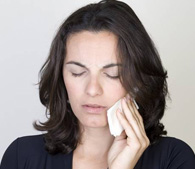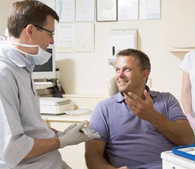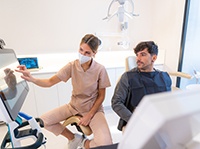Belchertown Emergency Dentistry
Urgent Dental Care When You Need It Most
 Emergencies can strike when we least expect them, and while most people know what to do during a medical emergency,
what to do when you’re in need of urgent dental care isn’t always as clear. Luckily for patients at
Valley Dentists of Belchertown, we are here to help whenever you need us, and that includes making ourselves
available during dental emergencies. No matter what the problem is, we’re prepared to get you the relief you
deserve! If you’d like to learn more about our emergency dentistry services, continue reading or give our office a call today.
Emergencies can strike when we least expect them, and while most people know what to do during a medical emergency,
what to do when you’re in need of urgent dental care isn’t always as clear. Luckily for patients at
Valley Dentists of Belchertown, we are here to help whenever you need us, and that includes making ourselves
available during dental emergencies. No matter what the problem is, we’re prepared to get you the relief you
deserve! If you’d like to learn more about our emergency dentistry services, continue reading or give our office a call today.
Why Choose Valley Dentists of Belchertown for Emergency Dental Care?
- Same-Day Emergency Appointments
- Multiple Financing Options Available
- Team Led by an Experienced Dentist
What to Do in a Dental Emergency

- Contact us right away. Whatever time you call us for a dental emergency, Dr. Medaugh or one of the other team members will get in touch with you within an hour. We’ll walk you through your situation to determine how quickly you’ll need to come in to see us and provide first-aid instructions over the phone to ensure your comfort and safety until you reach our office.
- Have an emergency exam. Once you get to us, we’ll conduct a thorough examination to identify the underlying cause. This process includes capturing X-rays to determine the extent of the problem. Using their findings, Dr. Medaugh will create a custom treatment plan to get your smile back on the right track.
- Get the care you need. We’ll work quickly to restore your oral health! Some common solutions for hurting teeth include fillings, crowns, root canal therapy, or extractions.
The Most Common Dental Emergencies
Understanding the Cost of Treating Dental Emergencies

When you’re in pain or dealing with a broken tooth, the last thing you want to worry about is how much it’s going to cost to fix it. At Valley Dentists of Belchertown, we believe emergency dental care should be fast, effective, and affordable. While the final cost depends on the type and severity of the emergency, we’ll guide you through all your options before moving forward. Dr. Medaugh and our team are here to relieve your discomfort and help you make confident, informed decisions about your care.
Every Dental Emergency Is Different

Not all dental emergencies are treated the same, which is why the cost can vary. For example, a simple toothache might only require antibiotics or a filling, while a knocked-out tooth could involve more complex procedures like dental implants.
During your emergency visit, Dr. M will carefully examine your mouth, diagnose the issue, and explain your treatment options. At our Belchertown practice, we focus on providing the right care at the right time. We’ll never recommend any unnecessary procedures, so you can be confident that you’ll get the relief you need without being nickel-and-dimed.
Does Dental Insurance Cover Dental Emergencies?

In most cases, yes! Dental insurance helps cover the cost of emergency treatments by as much as 50 to 80 percent, depending on the issue. This coverage can include exams, X-rays, and procedures like extractions or crowns. However, the amount covered depends on your specific plan and provider, so it’s always best to check.
If you need help navigating your benefits, we’re happy to take a look with you and handle all the paperwork. That way, you can focus on feeling better instead of figuring out the best way to utilize your coverage.
Other Options for Making Dental Emergencies Affordable

We understand that unexpected dental costs can be stressful. That’s why our dental practice in Belchertown offers several flexible payment solutions. For example:
- We accept cash, personal checks, and major credit cards
- Patients can enroll in a flexible payment plan
- Our dental membership plan offers discounted rates on many services
- We also work with CareCredit, which allows you to break costs into monthly payments
No one should have to put off care due to a bending budget. If you don’t know what to do, talk to our team. We’re here to help make emergency treatment stress-free and accessible.
Taking Care of Your Smile Can Save You Money

Preventive care is one of the smartest ways to avoid costly dental emergencies. Regular checkups, cleanings, and early treatment of small issues are a much smaller price to pay for good oral health!
At Valley Dentists of Belchertown, we encourage proactive dental habits to protect both your health and your wallet. Dr. M and our team will help you spot trouble early, often before you ever even feel any pain. Investing in your oral health today can save you from discomfort, stress, and bigger bills tomorrow. A healthy smile is always worth it!
Keys to Preventing Dental Emergencies

While we’ll be happy to help you address an oral health crisis at our Belchertown office, it’s always better to prevent one from happening in the first place. Luckily, you can avoid most dental disasters by sticking to a few common-sense precautions and taking excellent care of your teeth. Here’s a quick overview of a few of the best ways to prevent dental emergencies and keep your teeth beautiful and functional for life.
Visit Your Dentist Regularly

The American Dental Association recommends visiting your dentist twice a year for routine exams and cleanings. These appointments allow our team to thoroughly examine and clean your teeth and oral tissues, detect and address any problems we find in their early stages, and recommend better hygiene practices to implement at home.
Maintain Good Oral Hygiene at Home

Your daily oral hygiene routine is your first line of defense against painful and destructive oral infections. To keep your teeth and gums in great shape, stick to a daily regimen that includes brushing at least twice, flossing at least once, and rinsing with antibacterial mouthwash to eliminate plaque and lingering food debris.
Stick to a Nutritious Diet

Many popular foods and beverages are heavy with sugars, acids, and starches that can erode enamel and feel the harmful oral bacteria that cause cavities and gum disease. It’s best to limit your intake of items like soda pop, candy, pastries, and salty snacks and enjoy a diet that includes plenty of the vitamins, minerals, and proteins your body needs to stay healthy and protect your teeth and gums from infection. Be sure to eat nutritious foods such as fresh fruits and veggies, lean meats, white dairy products, and flavorful nuts and seeds.
Wear a Mouthguard

Athletes are notorious for suffering painful dental injuries. To prevent chips, cracks, fractures, and dislodgments, wear an athletic mouthguard when riding a bike or playing sports. If you grind your teeth in your sleep, wear a nightguard to minimize the damage and stress this causes. We’ll be happy to fit you for a customized dental appliance that provides superior protection.
Use Tools to Open Packages, Not Your Teeth

Using your teeth to open packages and bottles is an excellent way to cause painful dental injuries such as chips, cracks, and fractures, and it can even lead to tooth loss. To prevent these issues, invest in a proper tool for these tasks such as a bottle opener or a boxcutter.
Dental Emergency FAQs
 When a dental emergency strikes, your first thought might be to panic or go to the emergency room. However, Valley Dentists of Belchertown encourage you to call our office if you need help dealing with a dental emergency. Of course, if you have additional questions about how to handle current or future dental emergencies, take a look at our frequently asked questions section for guidance! If your question isn’t listed, we’re always just a phone call away!
When a dental emergency strikes, your first thought might be to panic or go to the emergency room. However, Valley Dentists of Belchertown encourage you to call our office if you need help dealing with a dental emergency. Of course, if you have additional questions about how to handle current or future dental emergencies, take a look at our frequently asked questions section for guidance! If your question isn’t listed, we’re always just a phone call away!
When should I go to the hospital instead?
While our office is largely equipped to handle a variety of dental emergencies, there are some issues that should be handled by an emergency room first before coming to our office. For example, if you are suffering from uncontrollable bleeding, a broken jaw, deep facial cuts, or discolorations in your jaw due to physical trauma, get to the emergency room as soon as possible. After you have stabilized, you can come to our office for closer examination and to confirm no other underlying issues are present.
Do I have to visit the dentist immediately for a dental emergency?
When you are dealing with a bad toothache that does not go away, loose, broken, or knocked-out teeth, facial swelling, dental abscesses and infections, or damaged restorations, you should get to our office as soon as you can. Dental issues largely do not get better with time. This means that the longer you wait to seek treatment, the more likely the problem will manifest into something worse. For example, a bad toothache could result in you needing a root canal later. The moment you feel that something is wrong, call our office to schedule an appointment.
How can I be better prepared for a dental emergency?
A great way to be prepared for a dental emergency is to have an established dental emergency kit to pull resources from. These are tools designed to make managing your dental emergency easier to deal with, not prevent a visit to our office. A few of these tools include:
- Small containers with a tight lid
- Gauze pads
- Handkerchiefs
- Bottle of acetaminophen (you can also carry ibuprofen or naproxen sodium)
- Contact number to our office for easy reference
What are the best painkillers for a toothache?
There are many painkillers out there that can provide effective relief for your dental discomfort. However, this relief will only be temporary, so you should not be taking them in order to avoid scheduling a visit with our office. Anti-inflammatory drugs like ibuprofen and acetaminophen both work to reduce discomfort, making them great options for providing relief. However, you should avoid aspirin as it can cause a burning sensation when coming into direct contact with your tooth.
What is the best way to preserve a knocked-out tooth?
We recommend placing your tooth back into its socket in order to keep it preserved for longer. While this is a great way to keep the tooth preserved until you arrive, milk is a great option as well for one main reason: proteins. Milk contains proteins that stimulate the growth of tooth root cells. This makes sure that the roots do not swell or become damaged further.








